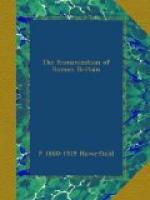[Footnote 1: Ammianus, xx. 1. The expedition was important enough to be recorded—unless I am mistaken—on coins such as those which show victorious Constans on a galley, recrossing the Channel after his success (Cohen, 9-13, &c.). On the history of the whole period for Britain see Cambridge Medieval History, i. 378, 379.]
[Footnote 2: See, for example, the coin-finds of the country-houses at Thruxton, Abbots Ann, Clanville, Holbury, Carisbrooke, &c., in Hampshire (Victoria Hist. of Hants, i. 294 foll.). The Croydon hoard deposited about A.D. 351 (Numismatic Chronicle, 1905, p. 37) may be assigned to the same cause.]
[Footnote 3: It is hard to believe him an Irishman, though Professor Rhys supports the idea (Cambrian Archaeol. Assoc., Kerry Meeting, 1891). The one ancient authority, Aurelius Victor (xxxix. 20), describes him simply as Menapiae civis. The Gaulish Menapii were well known; the Irish Menapii were very obscure, and the brief reference can only refer to the former.]
[Footnote 4: Mommsen, Roem. Gesch., v. 177. Zosimus, vi. 5 (A.D. 408), in a puzzling passage describes Britain as revolting from Rome when Constantine was tyrant (A.D. 407-11). It is generally assumed that when Constantine failed to protect these regions, they set up for themselves, and in that troubled time such a step would be natural enough. But Zosimus, a little later on (vi. 10, A.D. 410), casually states that Honorius wrote to Britain, bidding the provincials defend themselves, so that the act of 408 cannot have been final—unless, indeed, as the context of Zosimus suggests and as Gothofredus and others have thought, the name ‘Britain’ is here a copyist’s mistake for ‘Bruttii’ or some other Italian name. In any case the ‘groans of the Britons’ recorded by Gildas show that the island looked to Rome long after 410. On Constantine see Freeman, Western Europe in the Fifth Century, pp. 48, 148 and Bury, Life of St. Patrick, p. 329.]




